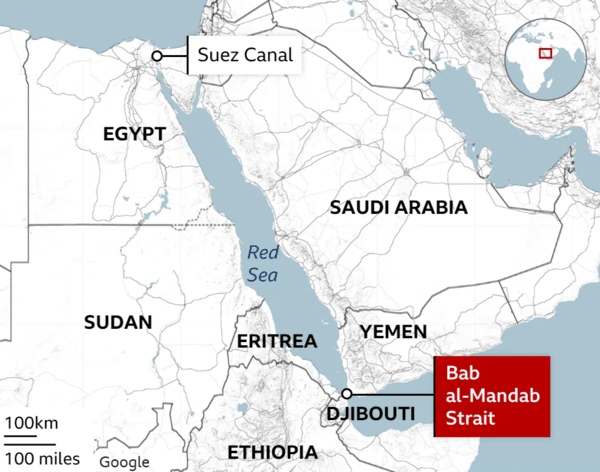Iran’s Plan to Strike Back Against the U.S.
Iran’s Military Preparations Following U.S. Attacks
Loading...
The United States, Britain, and 10 other states have warned Yemen's rebels that they will face consequences if they continue to attack commercial ships in the Red Sea.
In a joint statement, the group of mostly Western countries called for an immediate end to the attacks.
Iran-backed Houthi rebels have expressed support for Hamas in the war it launched against Israel in October.
Since November, rebels have attacked commercial ships in the Red Sea more than 20 times.
They used missiles, drones, fast boats, and helicopters. They claimed – often incorrectly – that the ships had ties to Israel.
US and British warships in the region have intercepted some missiles but have resisted attacks on targets in Yemen itself. That could change.
The group of twelve states – Australia, Bahrain, Belgium, Canada, Denmark, Germany, Italy, Japan, the Netherlands, New Zealand, Great Britain and the United States – issued a formal warning to the Houthis.
They called the ongoing Houthi attacks in the Red Sea “illegal, unacceptable and deeply destabilizing” and said “there is no legal justification for deliberately targeting civilian vessels and warships.” They said that if the group continued to attack the ships, they would "suffer the consequences."
This is widely interpreted as a threat of military action against targets in Yemen, including places where missiles are stored and launched.
The allies called for an "immediate end" to the attacks, which they said posed a "direct threat to freedom of navigation" on the waterway through which nearly 15% of world trade passes.
The fear is that fuel prices will rise and supply chains will be damaged.
The International Chamber of Shipping says 20% of the world's container ships avoid the Red Sea and instead sail around southern Africa. During a debate at the UN Security Council on Wednesday evening, the Houthi attacks were unanimously condemned but also warned of further escalation.
The United States Ambassador to the United Nations for Management and Reform, Chris Lu, said the attacks had had "a serious impact on maritime security, shipping and international trade."
He added that Iran's role was "the root of the problem." “Iran has long allowed these Houthi attacks,” he said.
Iran has denied supporting the attacks. However, it is unclear how it would react if Western airstrikes were launched against its Yemeni allies.
The Houthis have targeted ships passing through the Bab al-Mandab Strait – also known as the “Gate of Tears” – a 32km-wide channel known to be dangerous to navigate.

The group comes from a subgroup of the country's Shiite Muslim minority, the Zaïdis. They take their name from the movement's founder, Hussein al Houthi.
They have been waging a civil war against the Yemeni government since 2014 and control the capital Sanaa as well as the north of the country and the Red Sea coast. The government is supported against the Houthis by a coalition of Arab countries led by Saudi Arabia and the United Arab Emirates.
Editor
Iran’s Military Preparations Following U.S. Attacks
Troops remain in five strategic locations, raising fears of renewed tensions and long-term occupation.
Opposition forces have taken control of the capital after a significant offensive. Here is how it unravelled.
